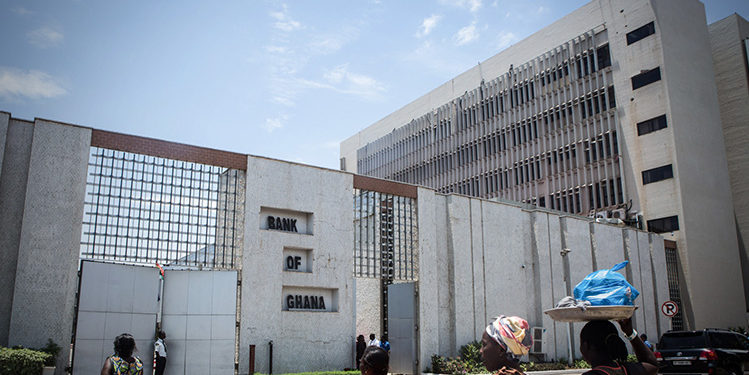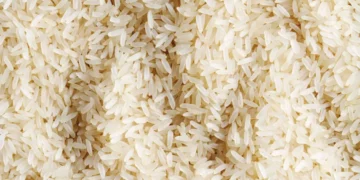Ghana’s economic crisis was caused by government borrowing – the central bank did the best it could
Ghana is going through its worst economic crisis in a generation. The past two years have seen record high inflation in the country. Ghana’s central bank (the Bank of Ghana) has been criticised in some quarters for its role in the country’s economic malaise, which has hit the profitability of Ghanaian banks. The Conversation Africa’s Godfred Akoto Boafo speaks to economist Emmanuel Ameyaw about monetary policy decisions made by the central bank during this period.
What was the Bank of Ghana’s role in the inflation rate crisis?
In 2002, Ghana’s parliament enacted the Bank of Ghana Act 612, Section 33(2), granting the central bank flexibility and autonomy in the use of monetary policy to tame inflation and promote economic growth. At the time, Ghana was struggling with high inflation and low economic growth. The inflation rate averaged 28% in the decade before 2002, and real GDP growth per capita hovered around 1.45%.
The bank unofficially targeted inflation from 2002 until 2007. Inflation fell from about 30% in 2003 to about 10% by 2007. Ghana’s real GDP per capita also rose to about 2.71%. The bank adopted inflation targeting as its official monetary policy framework in 2007.
But as I show in my recent paper, the decline in the inflation rate from 2002 to 2007 was largely due to fiscal policy – that is, the government’s use of taxation and expenditure to influence the economy – rather than monetary policy which is about adjusting interest rates to affect the economy. The period 2002-2007 coincided with Ghana’s term under the joint IMF-World Bank debt relief programme (also called the Heavily Indebted Poor Countries initiative). During this period, Ghana’s public debt (as a share of GDP) declined from 58% in 2002 to 22.5% in 2007.
I argue that it is this reduction in government debt that underlies the decrease in Ghana’s inflation rate during this period. The central bank during this period maintained a passive monetary policy as it did not need to control the inflation rate.
Government debt began to climb again in 2008 after the end of the debt relief programme. It rose from 24.6% in 2008 to about 79.2% in 2021. This drove up the inflation rate because when the government borrows heavily, it increases demand for goods and services, and without a corresponding increase in the supply of goods and services, prices increase, driving up inflation.
Ghana’s public debt reached its limit in 2022, leading to a downgrade of Ghana’s credit rating from Bs to Cs for the first time since 2003, triggering the 2022 crisis.
What could the central bank have done differently?
Similar to other central banks that target inflation, Ghana’s central bank also has a dual mandate. That is to achieve higher economic growth while keeping a low and stable inflation rate. When these two objectives align perfectly, a central bank is deemed to have achieved “divine coincidence”.
Achieving that, however, is difficult. If the central bank, for example, raises the interest rate to lower the inflation rate, the cost of borrowing also rises, leading to a fall in investment, consumption, and economic output.
The 2022 credit downgrade limited Ghana’s government’s ability to borrow internationally, and also reduced Ghana’s international reserves, resulting in a significant depreciation of the cedi and triggering the 2022 inflation crisis. Similar to achieving a divine coincidence, Ghana’s central bank had two options. It could have stood idle, or it could have stepped in by lending to the government.
The bank lent about 37.9bn cedis (US$3.2 billion) to the government, arguing that this kept the economy going. For example, interest payments on government debt and the salaries of public sector workers were paid on time, and there were no shortages of essential items.
What could the government have done differently to avoid the crisis? Well, the answer is obvious: the government should not have borrowed excessively, leading to the downgrade – the triggers of the crisis.
There is not much the central bank could have done differently in terms of monetary policy, except raising the interest rate even more to control the inflation rate, which has its own costs. This might have reduced the capital outflows and the worsening of the exchange rate. However, it would have also hurt private investment and consumption, which would have lowered economic output. The central bank had limited scope to effectively address the crisis via monetary policy.
Given that economic management is complex and full of trade-offs, I would argue that the Bank of Ghana’s actions during the crisis (that is, lending to the government) were appropriate if a collapse of the economy was indeed imminent. From the perspective of the central bank, it was facing a trade-off between avoiding a fiscal crisis (and hence lower economic growth) and avoiding a higher inflation rate. It chose the former, that is, avoiding a fiscal crisis.
What can the bank do better in future?
The Bank of Ghana appears to have fulfilled its role as a lender of last resort to the government, and prevented a situation where the government might have been unable to meet its financial obligations. On the other hand, lending to the government also worsened the inflation crisis.
As a lender of last resort, the central bank cannot be completely independent from the government. Currently, there are no laws that prohibit fiscal financing. As a result, the central bank has the discretion to not commit to zero fiscal financing, especially when a fiscal crisis is imminent.
In the future, the Ghanaian government could consider legislation prohibiting direct lending by the central bank to the government. There’s a similar policy in place at the European Central Bank. Under such legislation, the government could borrow only through bond sales from the public, but not directly from the central bank. Knowing that it won’t be able to turn to the central bank for funding, the government would likely exercise prudence in its spending to prevent the accumulation of public debt in the first place.








